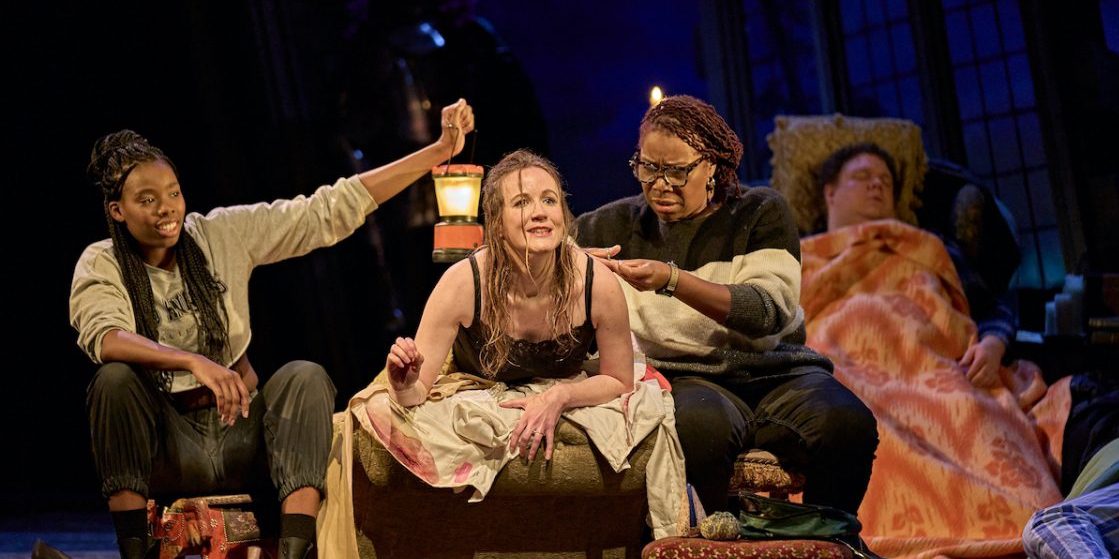Manor is a play that feels comfortable and isn’t. In that, it echoes the central themes of the play – the glamour and certainty that draws so many to fascism – especially the inherently unglamorous and uncertain, and the ongoing allure of taking the easy option in life as in politics.
Centred around the lady of the Manor Diana (Nancy Carroll) the play opens on domestic strife that spirals quickly into seeming tragedy and chaos. All the while, the turbulence within is matched by a storm outside of growing intensity and the encroaching fear of flood and destruction. However, what you think is going to be the heart of the drama turns out just to be scene setting. The real complexities are yet to come.
Here I would like to praise the astonishing staging and set by Lez Brotherston. While you can see all the sets at once, the demarcation is clear and bold. The roiling sky is incredibly atmospheric and matches the pacing of the drama superbly. The sky being visible throughout adds to the drama and makes the ever present storm almost a character in its own right. However, at times – particularly at the very beginning and very end of the play, the noise actually drowns out the words of the actors which was a shame.
As the storm gathers, so too do those fleeing it. The cast is introduced slowly as more and more are brought to the manor house to seek shelter. The out-of-place holiday makers from London and the vicar who rescues them. The flooded out caravan dwelling loser. The mysterious but charismatic trio whose car has been overwhelmed.
This play is ultimately about class. It has a racial element that is inevitable when it comes to discussing the fascism of Albion – the organisation led by Ted (Shaun Evans). But the interesting distinctions come between the similarity of innate superiority felt by upper class Diana and working class warrior Ted and the way both use and play on and contrast themselves against the seeming inferiority of unemployed Perry and ex-con Anton.
The audience is well represented and lovingly spoofed in the character of Fiske, the mild-mannered, well-meaning, climate warrior vicar. His sermonising and sometimes naive seeming lefty sentiment feels like a reflection of the average audience of the NT. But, while he is the only one to openly discuss doubt, he is also the character who doesn’t waver when it comes to confronting evil. He is not seduced by easy charm and confidence. Other characters are not so strong.
The character of Perry (Edward Judge) is one I found particularly interesting. Perry is fat and unemployed and lives in a caravan. He is also – it is hinted – an internet warrior. He knows who Ted Farrier is before the action starts and admires him. The other characters are instantly dismissive of Perry – often to his face – primarily by writing him off as ‘just fat’. Those of us who have been similarly dismissed (a friend’s (now) ex-husband once said of me “How come that fat cow gets to go to 10 Downing Street – to which the answer was “It’s my job”) know that pain. But that pain is an essential part of why Perry is vulnerable to Ted. Just as Anton was looking for someone to believe in him and help him escape a future of repeat offending, so too is Perry looking for someone to see his worth. That only Ted makes him feel that he does (however little he means it) is vital to showing the attraction of a strong man. The essence of fascism is the coercion of the ordinary
The only real problem with Manor is that it tries to do a bit too much. And as such, doesn’t give quite enough attention to its central moments. We don’t really see why certain characters – in particular Diana – make the final decisions they do. That could have been fleshed out with fewer subplots. Equally, the play doesn’t try to spoon feed the audience too much. For example, the fascist leader is clearly charming and persuasive and it is not to take away from the drama that this is so. I it is essential to it. The play wouldn’t work if he were repulsive. However, there was slightly too easy an out in his final actions and revelations. The play would have been harder on the audience – made us ask harder questions of ourselves – had this not been the case.
When approaching the theatre I felt a sense of trepidation at the length of it (two hours with an additional 20 minute interval). I needn’t have. The time flew by surprisingly well. So while I felt the play was occasionally disjointed I was engaged throughout. It is superbly acted with Ripley (Michele Austin) and Ted being particular standouts for me.
Overall this was a thought provoking, entertaining and subtle play. While I am not entirely sure it quite knew what it wanted to be, it delivered enough in the grey areas to leave me thinking about it for some time after the performance

